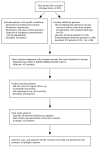Prevalance of Non-Provoke Generalize Tonic-Clonic Seizure in Sporadic Alzheimer's Disease
- PMID: 39720194
- PMCID: PMC11664052
- DOI: 10.14581/jer.24012
Prevalance of Non-Provoke Generalize Tonic-Clonic Seizure in Sporadic Alzheimer's Disease
Abstract
Background and purpose: Alzheimer's disease (AD) and epileptic seizure are among the most common health problems in the elderly population. This study aimed to estimate the prevalence rate and predictors of seizures in sporadic AD patients.
Methods: The study was conducted by retrospectively for a period of 10 years examining the file records. Patients were selected among the patients diagnosed with probable sporadic late onset AD according to the National Institute of Neurological Communicative Disorders and Stroke AD and related disorders association criteria and the diagnostic and statistical manual of mental disorders (n=451). In our 213 sporadic AD patients who were followed up regularly and had a follow up examination in the last 6 months, the file records were examined, scanned and questioned for the presence of epileptic seizures.
Results: The prevalence of non provoked generalized tonic clonic seizures in sporadic AD was found to be 6.57% (n=14). Neuroleptic use, presence of diabetes mellitus (DM) and/or treatment, presence of ischemic heart disease (IHD) and/or treatment were found to be 2.99 times, 1.91 times and 3.09 times higher in our patients who had seizures, respectively. When the factors that can affect seizures were examined, the use of neuroleptics and the presence of IHD and/or treatment were found to be statistically significant in terms of the risk of seizure in AD.
Conclusions: The use of neuroleptics, the presence of IHD and DM and/or their medications could facilitate the development of unprovoked generalized tonic clonic seizures in sporadic AD. It is doubtful whether the seizures are primary or secondary generalized.
Keywords: Alzheimer’s disease; Dementia; Seizure.
Copyright © 2024 Korean Epilepsy Society.
Conflict of interest statement
Conflicts of Interest: There is no conflict of interest between the authors.
Figures
Similar articles
-
Seizures in Alzheimer's disease: clinicopathologic study.J Geriatr Psychiatry Neurol. 1994 Oct-Dec;7(4):230-3. doi: 10.1177/089198879400700407. J Geriatr Psychiatry Neurol. 1994. PMID: 7826492
-
[First generalized tonic-clonic seizure].Tidsskr Nor Laegeforen. 2015 Aug 11;135(14):1256-8. doi: 10.4045/tidsskr.14.0654. eCollection 2015 Aug 11. Tidsskr Nor Laegeforen. 2015. PMID: 26269067 Review. Norwegian.
-
APOE4 Promotes Tonic-Clonic Seizures, an Effect Modified by Familial Alzheimer's Disease Mutations.Front Cell Dev Biol. 2021 Mar 16;9:656521. doi: 10.3389/fcell.2021.656521. eCollection 2021. Front Cell Dev Biol. 2021. PMID: 33796539 Free PMC article.
-
Lamotrigine adjunctive therapy among children and adolescents with primary generalized tonic-clonic seizures.Pediatrics. 2006 Aug;118(2):e371-8. doi: 10.1542/peds.2006-0148. Epub 2006 Jul 17. Pediatrics. 2006. PMID: 16847080 Clinical Trial.
-
Topiramate versus carbamazepine monotherapy for epilepsy: an individual participant data review.Cochrane Database Syst Rev. 2019 Jun 24;6(6):CD012065. doi: 10.1002/14651858.CD012065.pub3. Cochrane Database Syst Rev. 2019. PMID: 31233229 Free PMC article.
Cited by
-
Glymphatic System Dysfunction in Elderly Patients with Late-Onset Epilepsy and Comorbid Chronic Insomnia Revealed by Diffusion Tensor Imaging Along the Perivascular Space (DTI-ALPS).Neuropsychiatr Dis Treat. 2025 Aug 4;21:1589-1598. doi: 10.2147/NDT.S510089. eCollection 2025. Neuropsychiatr Dis Treat. 2025. PMID: 40787617 Free PMC article.
References
LinkOut - more resources
Full Text Sources


